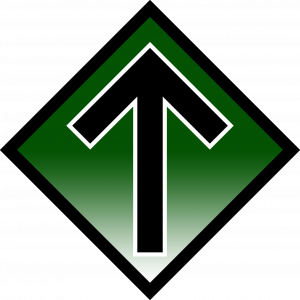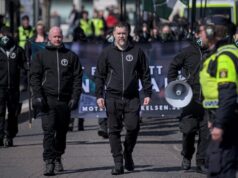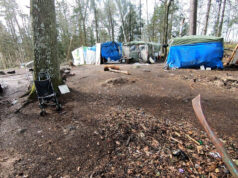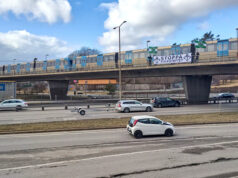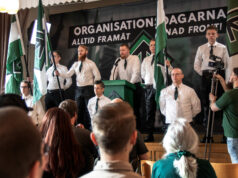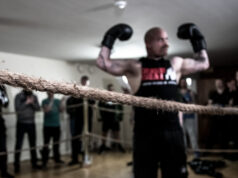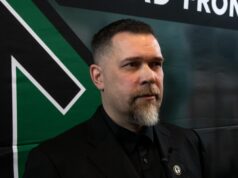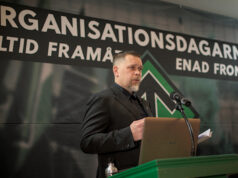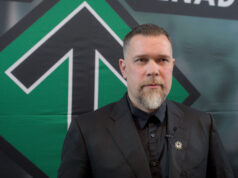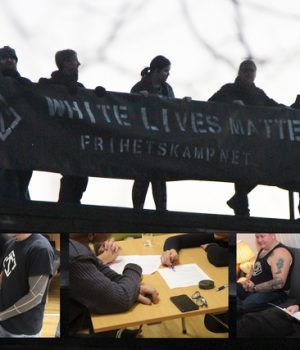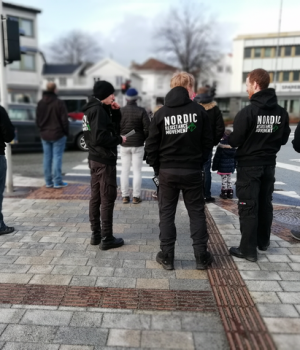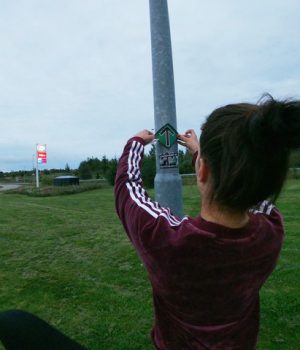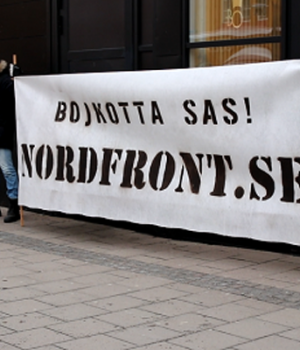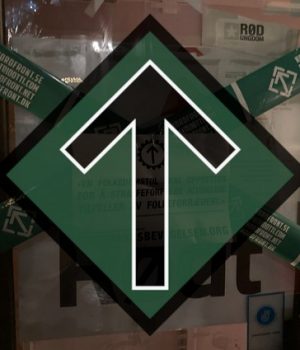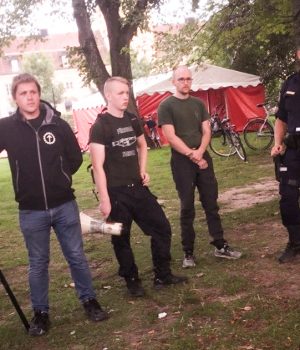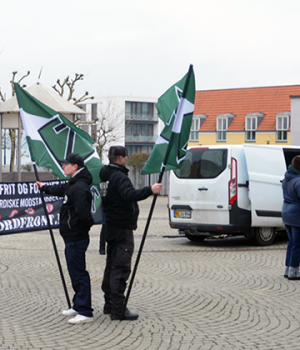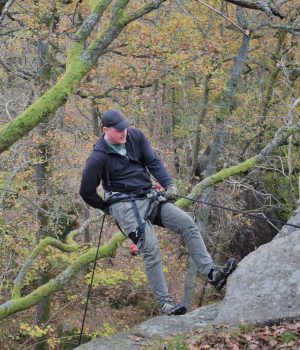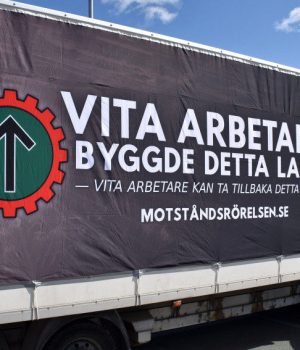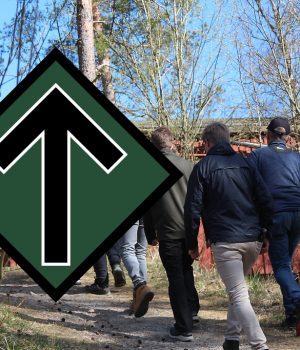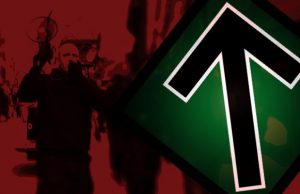RESISTANCE NEWS. Last week three Swedes were prevented by German police from going to Bulgaria to participate in the annual Lukov March in Sofia. Here Nicklas Norling, one of the Swedish men forced to go back home instead of visiting Sofia, tells us what happened.
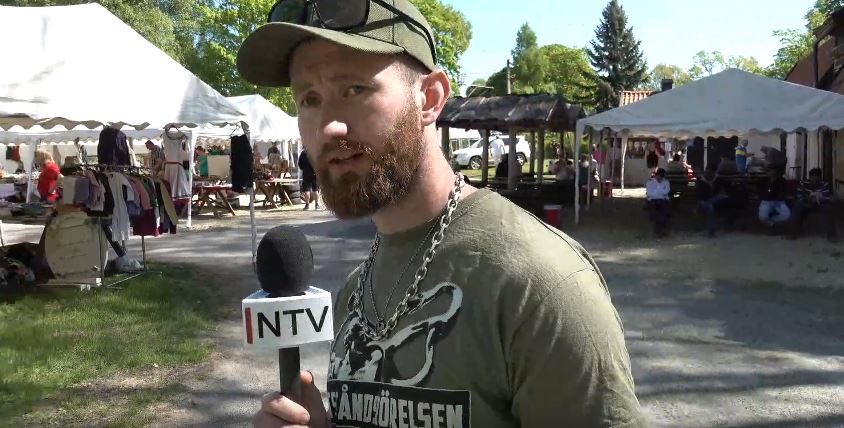
On 21st February Nordfront reported that a large number of Germans – as well as three Swedes – were prevented by German police from going to Bulgaria to participate in the annual nationalist Lukov March in Sofia.
One of these Swedes was Nicklas Norling, an activist in the Nordic Resistance Movement living in Dalarna.
Norling tells Nordfront that he and his fellow travellers stopped off at Munich airport on their way to Sofia, where they planned to participate in the Lukov March. After ten minutes at the airport, Norling and company were confronted by three police officers in civilian uniforms. They pointed out that the Swedes wore clothing featuring runes and other symbols banned in Germany.
“They told me that the shirt I was wearing featured illegal symbols and that a necklace worn by another person was also illegal,” Norling says.
The police asked the travellers to show their passports and asked questions regarding the purpose of their trip to Bulgaria.
Another person from Norling’s group also tells us that the police asked him if he was a “member of Nordfront”.
“The police then brought us into a room at the airport and started searching all of us and our luggage. They started with the women, who came back to the room after being examined. Then it was my turn. They brought me into a room with a cell where they examined me and tried to ask me about the trip,” Norling said.
“Then questions about the Nordic Resistance Movement came up and finally questions about the Lukov March. It then became clear to me that they had been waiting for us in order to mess with us. They found different things in my luggage featuring runes, and various T-shirts from Greenpilled. The police said that just possessing these objects is illegal in Germany.”
They even said that Norling’s engagement ring, featuring a life rune, was illegal.
The police later took away all the thought crime materials to photograph and document them, while Norling had to wait in his cell under constant watch by some kind of guard.
“I had to sit and wait for about two to three hours without anything happening,” Norling recounts.
“I was then brought into a room where they had gotten ahold of an interpreter on the phone, telling me in shaky Swedish that a ban has been issued against me going to Bulgaria. After that I was brought back into the cell again and was forced to sit there for an hour or two until three police officers came and took me out of the airport and into a police van. From there we went to the local Bavarian police.”
At the police station all of Norling’s belongings that are apparently illegal in Germany were registered. After a total of seven hours, he was finally released, not even getting something to eat.
“In the evening they even started eating their food right in front of me. Fortunately, I have been fasting periodically for about two months, so it didn’t bother me that much, despite not having had a proper meal for about 24 hours,” Norling tells us.
At the police station Norling also met two people from his group who had been informed they were suspected of a crime because of a necklace and two engagement rings with runes on them. Both people were also banned from travelling to Bulgaria. He later came into contact with another two travellers from their group who had been released and were free to continue their trip to Sofia.
“The three of us who were stranded in Germany booked ourselves into a hotel and spent the entire Friday phoning embassies in Sweden, Germany and Bulgaria to try to find out about the legitimacy of the ban. But the interest in helping us was lukewarm, to put it mildly. They did all admit that the situation seemed very weird though,” Norling says.
The group received a translated version of the travel ban from German comrades. It said that the police had issued the ban because, in their opinion, Norling and his two comrades were members of the Nordic Resistance Movement and were thus suspected of intending to participate in the Lukov March and to “radicalize people”.
As they felt their participation in the Lukov March was not crucial to its success, Norling and his two comrades ultimately decided to go back to Sweden.
“Since we now know that the march ended up being banned, it’s obviously very disappointing that we couldn’t be there to make sure it took place anyway,” Norling says. He adds that he is very interested in the developments in Bulgaria.
“In closing, I’d like to say that I hate the Federal Republic of Germany, and next time I set my foot on German soil will be when Germany has been liberated. I still hold the German people in high regard, though!” Norling concludes.

